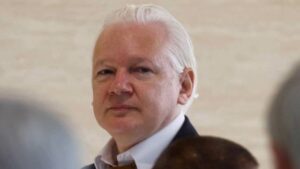After a 14-year legal ordeal including over five years in Britain’s harsh, maximum security Belmarsh Prison, the founder of the whistleblower website WikiLeaks agreed to a deal with the United States, pleading guilty to a single felony count of obtaining and disclosing national security material. His sentence: Time served.
Assange appeared in the US District Court in the Northern Mariana Islands, where Judge Ramona Manglona said, “This case ends with me here in Saipan…you will be able to walk out of this courtroom a free man.” She added, “I understand your birthday is next week. I hope you will start your new life in a positive manner.”
Assange’s legal odyssey included house arrest for a year, at a manor house in rural England, seven years in the cramped Ecuadorian embassy in London under political asylum, and then Belmarsh. He was fighting extradition to the United States, where he faced up to 175 years in prison.
“There was a court date set for the 9th and 10th of July…in which Julian would be able to raise the First Amendment argument at the High Court” Stella Moris Assange, Julian’s wife, said to the press shortly after her husband landed in Canberra, Australia, describing the extradition appeal in the UK courts that was to occur next month. “It revealed how uncomfortable the United States government is, in fact, of having these arguments aired, because the fact is that this case is an attack on journalism, it’s an attack on the public’s right to know.”
Stella, a human rights attorney herself, hopes that Julian will eventually receive a pardon. She was accompanied by Julian’s two lawyers, Jennifer Robinson, a remarkable human rights attorney from Australia, who has been defending Julian Assange since the beginning, and Barry Pollack, his US lawyer. Pollack said to the press,
“No one should spend a day in prison for giving the public newsworthy and important information — in this case, information that the United States government had committed war crimes, that there were civilian casualties exponentially greater than the United States government had admitted in Iraq and Afghanistan…Julian provided it to the public. He performed a tremendous public service, not a crime.”
The US prosecution of Julian Assange has raised alarms globally over its potentially devastating impact on journalism.
“We’ve averted a press freedom catastrophe,” Jameel Jaffer, director of the Knight First Amendment Institute at Columbia University, said on the Democracy Now! news hour.
“The indictment…charges Julian Assange with having solicited government secrets and having published government secrets. Those are things that journalists do all the time, that news organizations need to do if they are going to play the role that we want them to play in our democracies. The concern was always that if this case went to an American court, an American court would rule or might rule that the Espionage Act made that kind of activity illegal and that the First Amendment didn’t protect that kind of activity. That would have had…catastrophic implications for press freedom.”
Asked about the impact of the Assange case on that of Wall Street Journal reporter Evan Gerskovich, now on trial in Russia, Jaffer replied,
“[It] made it a lot more difficult for American government officials to champion press freedom in other contexts. And I think Evan’s case is one of them.”
For over a century, the US Espionage Act had never been used to prosecute a journalist. President Barack Obama used it to target government whistleblowers, like senior NSA official Thomas Drake, who exposed over $1 billion of wasted taxpayer money at the spy agency.
In April 2019, British authorities raided the Ecuadorian embassy, arresting Assange. Weeks later, the Trump administration unsealed an indictment that had reportedly been in the works since as early as 2010, charging Assange with espionage and hacking.
Over the years, Democracy Now! has covered WikiLeaks closely, interviewing Julian Assange numerous times. Prior to fleeing to the Ecuadorian embassy, when he was under house arrest in the UK but allowed to travel during daytime with an ankle monitor, we moderated an afternoon event with Julian and Slovenian philosopher Slavoj Zizek in East London.
It was July 2nd, 2011, one day before Julian’s 40th birthday. We asked him what gave him hope. Thirteen years later, his reply then remains strikingly relevant:
“There’s the big future, there’s the deep future, that one can long for. That is a future where we are all able to freely communicate our hopes and dreams, factual information about the world with each other, and the historical record is an item that is completely sacrosanct, that would never be changed, never be modified, never be deleted … From that, justice flows.”
___________________________________________
Amy Goodman is the host of “Democracy Now!” a daily international TV/radio news hour airing on more than 900 stations in North America. She is the author of Breaking the Sound Barrier, released in paperback and now a New York Times best-seller.
Denis Moynihan is the co-founder of Democracy Now! Since 2002, he has participated in the organization’s worldwide distribution, infrastructure development, and the coordination of complex live broadcasts from many continents. He lives in Denver where he is developing a new noncommercial community radio station.
The original content of this program is licensed under a Creative Commons Attribution-Noncommercial-No Derivative Works 3.0 United States License.
